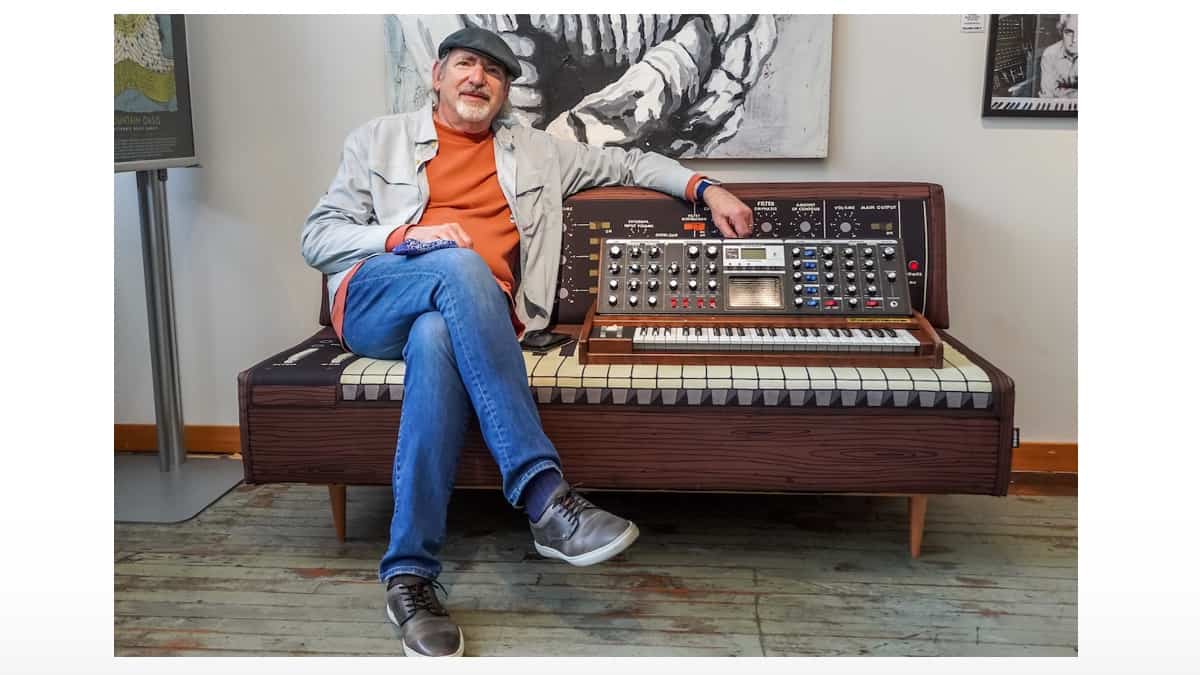Events
Bob Moog Foundation Announces First Minimoog Voyager Ever Sold in New Exhibit at Moogseum

It’s serial #002, donated from the synth cellar of Board of Directors President Dave Mash
Here’s a press release from the Bob Moog Foundation, a non-profit that preserves rare Moog instruments, schematics, etc., and also runs Dr. Bob’s SoundSchool, a program that teaches children about the science of sound through music and technology. We want to enroll, and we want that couch.
June 1, 2021 – Asheville, NC…The Bob Moog Foundation is excited to announce the exhibition of the first Moog Voyager ever sold, serial #002 Signature Edition Minimoog Voyager, now on display to the public at the Moogseum. Recently donated to the Bob Moog Foundation Archives by President of their Board of Directors David Mash, Voyager serial #002 was hand-built, signed by Bob Moog, and was the first ever sale from the current Moog Music, Inc. company.
The new The First Minimoog Voyager Ever Sold exhibit is part of the Moogseum’s Bob’s Workbench exhibit, which focuses on modular synthesis and showcases some of the tools that Bob Moog used in his creations. The exhibit features a legendary modular that includes prototype modules from the late ‘60s. In addition to the signed Voyager, the new exhibit also includes a Certificate of Authenticity signed by Bob Moog, a written reflection about working on the development of the Minimoog Voyager from former Moog engineer August Worley, and a letter from President/CEO of Moog Music, Inc., Mike Adams, detailing the instrument’s origin. The back panel of the Voyager has been carefully removed, and the exhibit has been backed by a mirror to allow visitors to visually explore the intricacies of the synthesizer’s circuitry.
Considered to have been Bob Moog’s crowning achievement, the Minimoog Voyager is a handcrafted, all-analog performance synthesizer that incorporates the features and incredible sonic range of the original Minimoog, while adding a vast number of new functional improvements to its design.
“In 2002, Berklee awarded Bob an Honorary Doctorate in Music for his lasting contribution to the world of sound and music,” recalls David Mash. “To further honor Bob, Berklee put on a student concert that featured music inspired by Moog synthesizers. I called Bob to ask if he wanted us to use some vintage instruments on stage, and he preferred that we use his latest synthesizer design, a new Minimoog that would be called the ‘Voyager.’ He sent me the instrument in an early stage of completion, including boards labelled ‘Big Briar’, and we used it in the concert. After purchasing the instrument, I sent it back to the factory so it could be completed and brought up to production standards (including replacing the Big Briar boards with updated Moog Music, Inc. boards).
“This year, I decided that this special instrument should have a special home,” continues Mash, “and where better than the Moogseum, for all to see? It is a small way for me to give back to Bob’s legacy, for all he did to impact my life for the better. It’s a way for us to honor all he did to inspire countless musicians to create new music with his instruments, and all the other synthesizer creators who were moved to design and build their own, furthering the art of electronic sound. I am grateful to have called Bob a friend, and to serve as President of the Bob Moog Foundation Board—whose mission is to ignite creativity at the intersection of music, science, history and innovation.”
“We are thrilled to have this unique synthesizer within the Bob’s Workbench exhibit in the Moogseum,” remarked Michelle Moog-Koussa, Executive Director of the Bob Moog Foundation. “Alongside the 1967 Moog modular synthesizer, the Voyager represents one of the first, and one of the last of Bob’s synthesizer designs.”
Statement from David Mash here
















